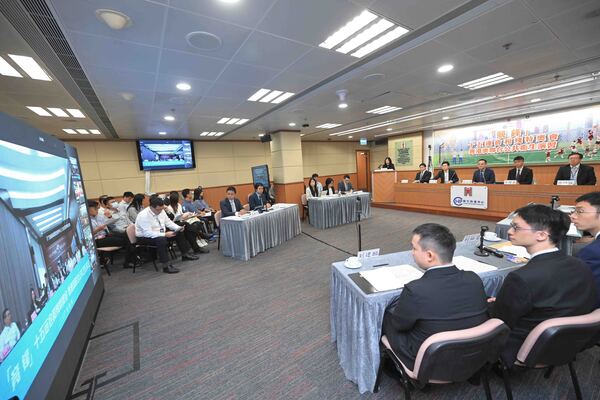
The Department of Health’s Centre for Health Protection (CHP), in collaboration with Guangdong and Macau’s health authorities, today conducted a public health exercise to enhance the capacity of the three places to co-operate in preventing and controlling communicable diseases during major sports events.
The exercise was held in preparation for the 15th National Games (15th NG), the 12th National Games for Persons with Disabilities (NGD), and the 9th National Special Olympic Games (NSOG), which will be co-hosted by Guangdong, Hong Kong and Macau this November and December.
The exercise simulated a scenario in which two players participating in the 15th NG basketball competition in Hong Kong were diagnosed with meningococcal infection while they were in the city. An epidemiological investigation revealed that some of their close contacts had already departed Hong Kong for Shenzhen and Macau.
In accordance with the established mechanism, Hong Kong immediately notified the health authorities of Guangdong and Macau. The three places’ health authorities promptly traced the cases and implemented appropriate infection control measures to prevent the spread of the communicable disease.
During the exercise, the CHP, together with the Guangdong Provincial Disease Control & Prevention Administration, the Guangdong Provincial Center for Disease Control & Prevention as well as Macau’s Health Bureau conducted a drill and exchanged views on communicable disease surveillance, prevention, control and notification mechanisms during the 15th NG, and 12th NGD and 9th NSOG via a video conference.
More than 30 officers from the three places’ health authorities participated in the exercise.
Director of Health Dr Ronald Lam gave a speech before the exercise started, noting that the 15th NG, and NGD and NSOG are the largest and highest-level national multisport events in the country.
Dr Lam said: “It is of great strategic significance for the health authorities of Guangdong, Hong Kong and Macau to jointly organise this exercise on communicable disease prevention and control at the countdown stage of the opening of the games.
“Through the simulation, we hope to achieve three major objectives: to strengthen the joint prevention mechanism of the three places; to build a solid risk identification defense; and to consolidate the foundation of event protection. This will allow the top athletes in the country to demonstrate the country’s sports prowess under a ‘zero significant outbreak, zero cross-infections’ condition, and showcase the country’s excellence in public health governance to the world.”
Dr Lam added that as Guangdong, Hong Kong and Macau are geographically and culturally connected, only through close collaboration can the three centres cope with major public health challenges.
Apart from the health authorities of the three places, representatives from the Medical & Health Office of the Comprehensive Security Department of the Guangdong Provincial Executive Committees for the 15th NG, NGD and NSOG, National Games Coordination Office (Hong Kong) as well as Hong Kong’s Auxiliary Medical Service, Fire Services Department and Hospital Authority also sent their staff to observe the exercise.





















